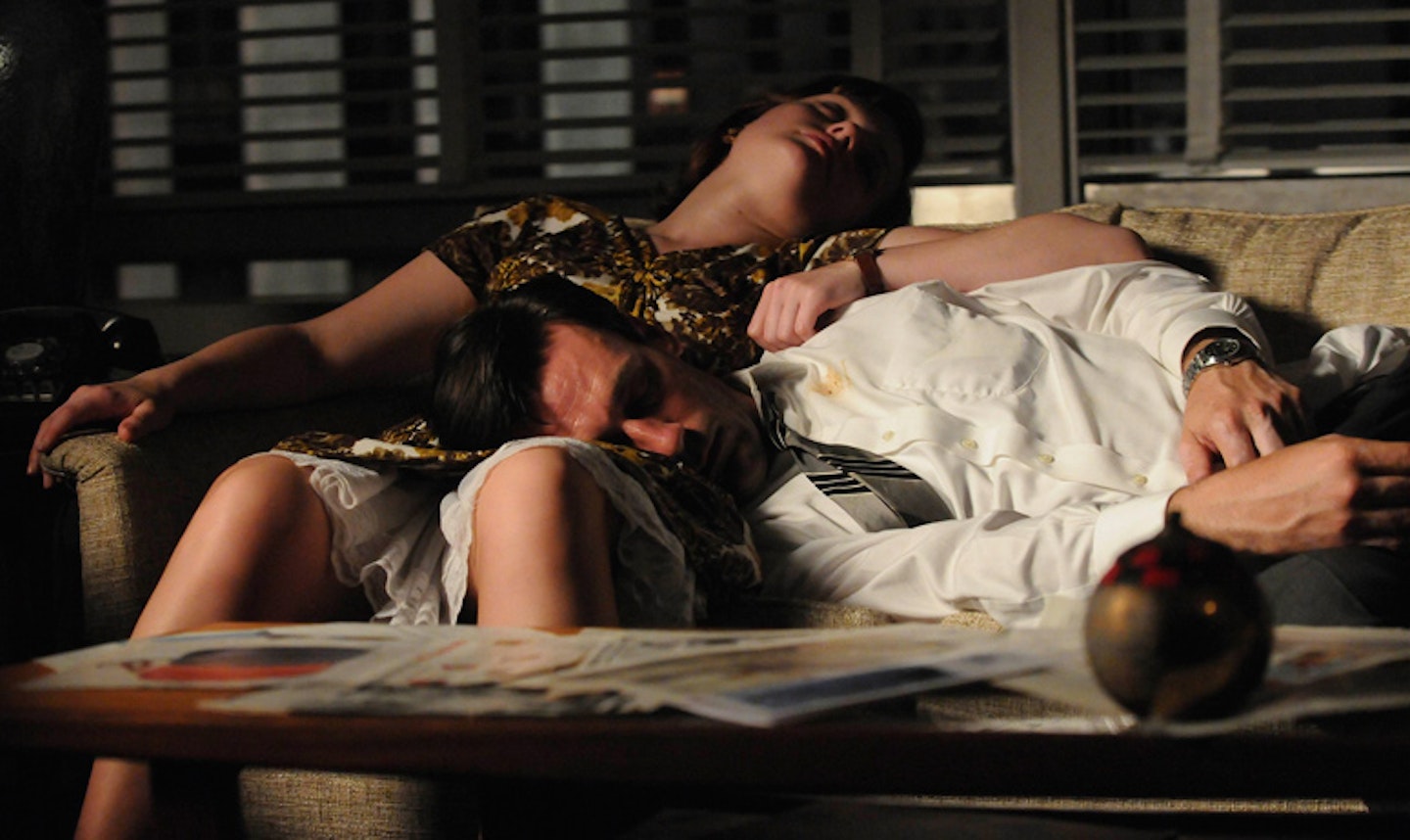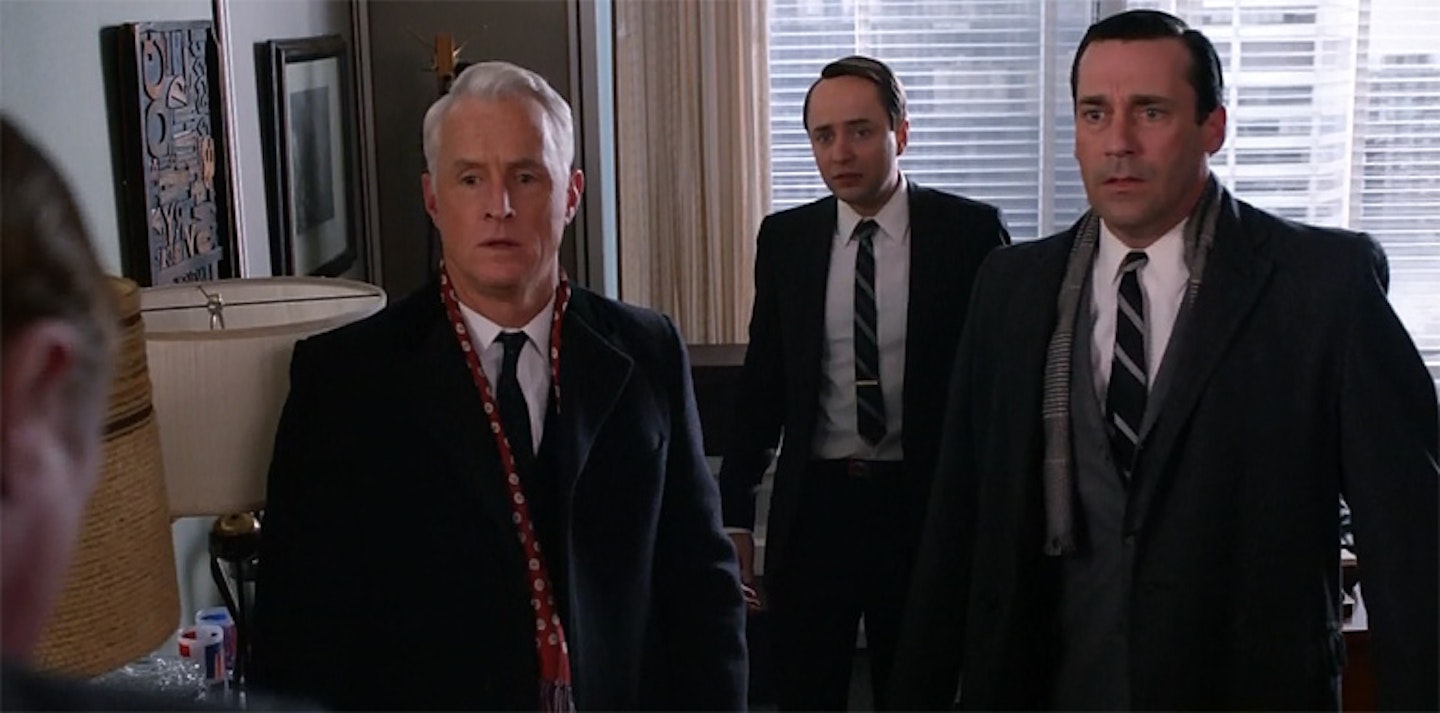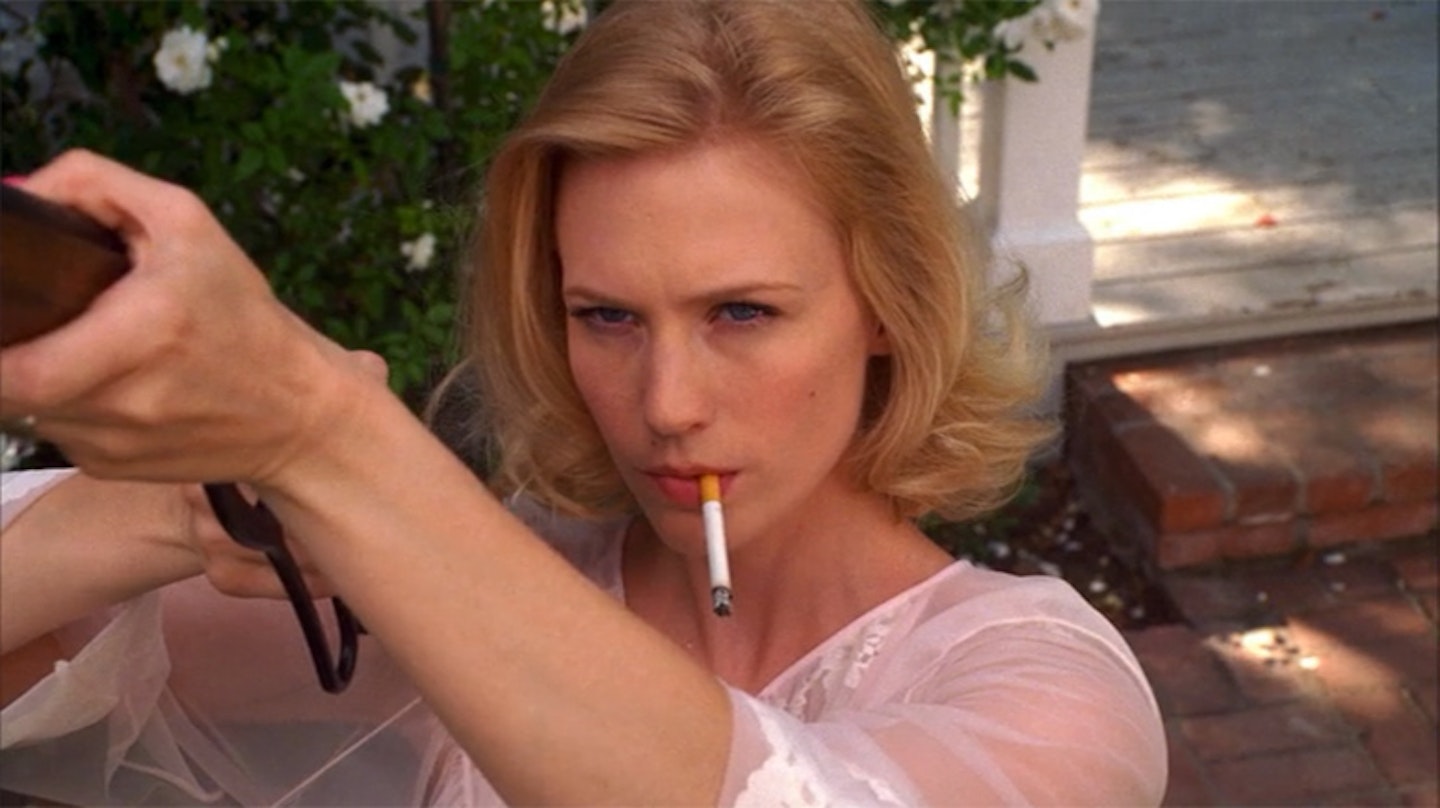Mad Men's writer, producer, creator and showrunner, Matthew Weiner is the driving force behind AMC's long-running show. After eight years, 15 Emmys and four Golden Globes, his critically-acclaimed drama has started its victory lap, with the final half of its final season about to air. To bid farewell, Empire spoke to Weiner about seven key moments from the show's gilded history. If you're not completely up to date, click away now, but if you've watched all the way up to the end of part one of season 7, prepare to find out a lot more about Don Draper and company.
Mad Men airs on Sky Atlantic, starting on Thursday April 16, 12.20am.
Episode: 'Guy Walks Into An Advertising Agency' (Season 3, episode 6)
"The Lawnmower episode was not an attempt to burst the show’s stylish bubble, per se. That was a very hard [episode] to get the story right on. It wasn't as hard to execute, actually, because the people who worked on it, such as the director Lesli Linka Glatter and the special effects people, do this sort of thing all the time - just not on Mad Men. Up until that point, most of our special effects had involved vomit. What I was interested in was to have the twist of the story dramatised.
You want to show the repercussions of workers drinking in the office all the time. I’d heard a lot of stories about it, and at some point, there had to be something very disastrous [happen]. I also needed to tell a story about expectations, and it took me a while to figure out how it would work.
Myself and a lot of the writers fell in love with this idea that the story would be irretrievably going in one direction. Don is excited about the British coming in, because he’s been told that he’s going to get a promotion - that everyone in the office is moving up, that this was a huge opportunity. Then this guy walks in, Guy MacKendrick, who is obviously his replacement. With casting, we were looking for a guy who an actor that the audience would look at and say, ‘Oh, it’s the new main character of the show!’
Then, to have the lawnmower roll over his foot, and everything turn back to the way it was, instantly, that was an interesting story for me. An interesting observation about human nature: if I tell you something amazing is going to happen to you and the next day I say we’re not doing it, nothing’s happened, except for the news. How are you any different? Well, your investment in that is huge.
So that was our way of turning the story over. In terms of the graphic-ness, I didn’t even think about it. I just thought it was funny. A lot of funny things turn out to be very, very sad. This is one were I was right, whereas Freddie Rumsen peeing in his pants was hilarious in my head, but not on screen. It was very sad."
Episode: 'The Suitcase' (Season 4, episode 7)

"Duck defecating on Roger’s chair? That was definitely meant to be funny. I always thought that was going to be funny! (Laughs) I was so happy that the actors and the directors really committed to that. It was a story that we’d heard about a famous American executive, where when he fired people, he would take a dump in their chair (laughs). The fact that he’s in the wrong office, that makes it funnier.
I think there are two things that happen when you rewatch the show - and I have discovered this myself - firstly, you forget all the stories that go together. You’re always watching an episode and saying, ‘*That *was in this episode?’ Even though they were designed at the time to be put together with thematic unity, I am still surprised. There are episodes where a lot of famous stories congregate. The other thing is that there’s a lot of humour in the show – I always wanted it to be funny, and my background was in sitcoms – so I think that is another surprise for people, that there’s a lot of humour in it. And I think the humour of the show is based in a realistic response to absurd situations, and that’s the thing that makes the sad stuff sadder. That’s my thought on it.
In 'The Suitcase' in particular, yes, it’s sad what happens to [Don and Peggy], but you’re trying to do an episode where you’re bringing two characters together, and you can do a fake version of it, where it’s really sentimental and one of them helps the other one out, or you put them through a trial, through a tough situation. They’re mad at each other. It’s what you look for in life: ‘Yeah, we fight a lot, but we love each other.’ But I feel that the end of that episode in particular is uplifting."
**Episode: **'Signal 30' (Season 5, episode 5)
"I feel like life is frequently punching Pete in the face. And when you spend time with him, it’s about how he gets up again. I think eventually he did learn something in season 6, when he encountered Bob Benson and he was like Don, so he decided to just back away. That shows some growth.
But I like the fact that Pete can’t believe that his mouth is going to get him into a situation where he might be challenged to a fight at work, especially with Lane, who is so dignified. Part of what’s fun about it is Pete’s overconfidence with his status. He's being a bully and does not expect to be called on it. I hate to say it, but I think a lot of us can identify with Pete in that situation: your mouth gets away from you. There’s a great Mose Allison song that goes, 'Your mind is on vacation but your mouth is working overtime', and it’s a lot like that. He didn't think he was going to be called up by this genteel person; that this weak man was going to stand up for himself.
Part of the fun of that is that Pete Campbell is not expecting to be in a physical universe. It’s mostly posturing. And yet he has never backed away from it. He looks scared, but you’ll see he is someone who is experienced with physical altercation, and even if we haven’t seen him win a fight – other than sucker-punching Ken in the first season – he’s definitely had some experience in being in them. But you know… what’s the phrase? 'Violence is the last refuge of the incompetent'. And with that, Pete always thinks he can talk his way out of this moments.
There was a moment when I realised Vincent [Kartheiser] was a very physical actor. I should say all of them are, really, but in the first season, when Pete blackmails Don, Don gets up and comes around the table – and the director did a great job of this action of Don coming up from his desk to say “What would you do?” – but Vincent physically recoils then. I don’t think he was scared of Jon Hamm, there was never going to be any unscripted violence there, but right away I realised that Pete is like most of us: he’s all bravado. He’s talking tough, but now there’s something physical..."
Episode: 'Commissions And Fees' (Season 5, episode 12)

"Everyone going along happily and rising to the top of the company is not entertaining. Some viewers may want that, but really, it is so, so, so, so boring. No-one has done it. I was kind of proud of the fact that in the first half of season 7 we did a success story with Don Draper. We did a man working in his own company, and the only reason it had any tension was because of the language of the show – the language that makes you think, 'Hang on, what’s he doing? What’s going to happen? What’s going to go wrong? This can’t work out…'
But with Lane, just to be clear, it wasn’t because I wanted someone to commit suicide. I had heard this anecdote back in the first season about someone hanging themselves in their office and their colleagues not being able to open the door because they were in front of it. This was a real situation of life. This would be an interesting event. That was how it started.
I didn’t want to exploit this idea early on, I wanted to take my time. Lane was the perfect counterpoint to Don in terms of his ability to transform. And not to be too critical of British society, but transforming the way Don has is harder to do for someone from Britain than it is for someone from the United States. It could be because of someone's accent, or the biological sense of class that Brits have that we do not have here.
Our society is completely based on cash. And in a way, Lane committing suicide was a reflection of his antiquated sense of honour. It wasn’t just a depressed person giving up, it was... the thing to do. That’s cultural also, something that you’d only see in the South, perhaps, in the USA.
So putting him in this situation, you see that Don changed and Lane did not. Was it his timidity? Was it his flirtation with a new life when his wife wasn’t there? His love of America and his desire to assimilate? He just couldn’t take it all the way. Jared Harris himself added one of the lines in there, 'It’s particularly British…' Failing like this, he cannot go home. Jared actually directed one of the episodes in the second half of the final season, incidentally. Episode 11."
Episode: 'Far Away Places' (Season 5, episode 5)
"LSD had to be part of the show. I couldn’t pretend it wasn’t part of the show. But it wasn’t always going to be Roger taking it. I felt, and it still may be true, that Bert Cooper would be the first person to get his hands on LSD. It was legal in the United States into 1965, I think, and people of Bert's ilk got to be the pioneers of the drug.
What was fun about doing it with Roger was imagining what a drug-induced epiphany for him would look like. And what is the epiphany for that man? The idea that he would suddenly realise that other people had thoughts… That idea is an epiphany because he’s in such a bubble of privilege. He’s both very good-natured and selfish in the most endearing way. I thought a moment outside himself as he’s taking the drug was a good way of getting LSD into the show. As with a lot of the historic things of the show, we had a challenge because it’s been done so much before that you don’t want to do it the same, or even distinctly ‘differently’ – you just want it to be a realistic as possible.
It’s been depicted a lot in film, and it’s usually done with flashing colours and stuff like that. Now, I’ve not taken the drug, so I don’t personally know, but I’m certain it’s not actually like that. Fortunately, a lot of the other people around me had taken it, and I do have a tenuous relationship with reality, so I had that going for me. So the edict was, ‘The character was on drugs, the camera is not on drugs.’
You do hear later on that people like Kinsey, who has also joined a cult, had taken it. But in terms of someone we know having a first person experience, you don’t just want to do it to do it, it has to be part of the story. And Roger needed to change, and what a way to do it. The thing is, all of our characters are too old to be really part of what is conventionally seen as the ‘60s. There’s no-one draft age, for example. And that’s part of what is the point of the show: to show the ‘60s from the view of the adults. And among out adults, I think Don would be willing to take it, but it’s really Roger – he’s the adventurer. He’d shrug and say, ‘What the hell, why not?'"
Episode: 'Shoot' (Season 1, episode 9)

"When we were writing the shotgun Betty episode, we didn’t know that there’d be more of the show. It was the first season, and I only knew there was going to be one season. For me, that is what we were working for: that great encapsulation of her situation. Part of it is political, and part of it is her personality, but that idea that she is torn between what she feels at times is the uselessness of her motherhood and her ambitions and her definition – self-imposed or not – of being a beautiful object. That shotgun scene was the culmination of that for me.
I knew that was going to be a big moment in the show, from our point of view. I never presumed that anyone would see it, period. During the very first episode, they had cut together a bunch of shots as a montage of what’s coming, to get the audience interested, and they put that shot in there. After it was put out, I told them that they could not show that footage ever again. I did not want the audience to see that until we got there.
What’s really magical about it – and it was based on something that happened to my writer’s assistant’s mother, actually – was the gathering together of a lot of Betty’s character: anger and an impulsive response to an untenable situation. She’s protecting her children, and she’s frustrated she can’t have it all. January Jones had shot some guns before, she’s from that part of the country, and she loved it. It was written that the cigarette would be in her mouth, but I had no idea she’d look so Clint Eastwood doing it.
The scene was enhanced by the difficulty in finding the right piece of music to accompany it. ‘My Special Angel’ by Bobby Helms is what we went for, which is probably about a teenage boy and a teenage girl, and it’s so sweet..."
**Episode: **'Lady Lazarus' (Season 5, episode 8)
"I would love to clarify that when it comes to getting ‘Tomorrow Never Knows’ by The Beatles, it was not about the money. Apple Records had never said, ‘If the price is right, we’ll do it.’ At that point in the show, for over three years I had tried three times to get a Beatles track on the show because I felt not only were The Beatles such a big part of the period, but not having their music in there was a lie. It made the entire show feel completely artificial, and, well, like a TV show. And while it is a TV show, I wanted to make it as comprehensive as possible, to show what the culture was like.
So we started with (The Rolling Stones') ‘I Wanna Be Your Man’ – I think that was the first thing I tried to get – and that was for the season 4 premiere, and then I tried to get ‘Do You Want To Know A Secret?’ for Hands And Knees, which was in season 5, and in the end, I used the (Italian-American rock duo) Santo & Johnny version. And I knew I was going to have Don sing ‘I Want To Hold Your Hand’, but then had him whistle it, but that’s not really the same as actually having The Beatles. I remember trying to use a Peter And Gordon song, but Paul McCartney had written that one as well!
Later, it was finally coming back to me that the some of the heirs actually liked the show. Some of the actors had run into Olivia Harrison, and various other people, and they were fans of it. But what really made it happen was showing up in person to meet Jeff Jones, the head of Apple Corps, in London. It wasn’t my only reason for going to London, but anyway, I sat down him and discussed the issue. I don’t think he’d seen the show at that point, and really, it wasn’t about the money. What was great, though, was picking the song for 1969, and knowing it would be ‘Tomorrow Never Knows’ and having the story for it.
I loved the song because it represented taking a risk, which is what The Beatles were doing at that time, confounding some people by turning inward and doing what they wanted to do. And having that track released at the height of their popularity, and all the innovative stuff that was going on at the time... this was a statement I wanted to make with Don. Don had lost his romantic fantasy of his wife when she decided she didn’t want to work there any more. It wasn’t about him being out of touch, it was about wanting to hear a Beatles song after suffering this narcissistic wound. Surrender to the void."